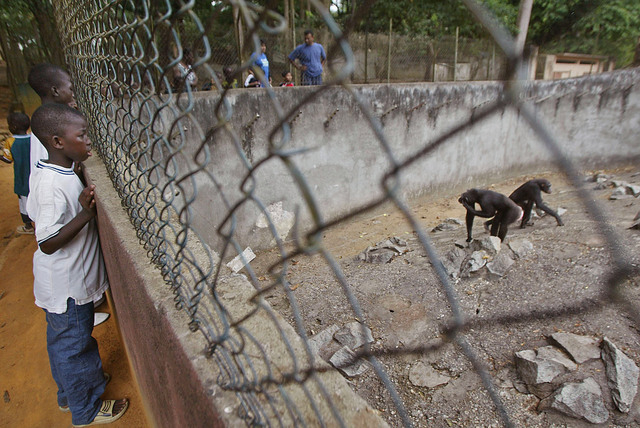African nation may try ecotourism to save chimpanzees

TAI NATIONAL PARK, Ivory Coast — Before dawn in the thick rainforest of western Ivory Coast, the air was filled with the sounds of male chimpanzees screaming, hooting and banging on trees.
A baby chimpanzee named Dali slowly stretched out his brown, furry arms and clumsily scrambled from a branch 65 feet high for a breakfast of nuts and insects provided by game rangers. In the next few minutes he would be joined by 15 others who soon clambered off into the depths of Tai National Park.
Chimpanzees normally resent humans, but scientists in the park have spent decades “habituating” them so they could be studied. Two years ago, a Disney film got up close for the Tim Allen-narrated “Chimpanzee,” which was set in Tai park.
Now, conservationists and the Ivorian government hope to take advantage of the fact that chimps in Tai park are relatively comfortable around humans by launching eco-tourism projects designed to stem the chimpanzee population’s precipitous decline.
“Through ecotourism, local people gain something. They see the value of the forest … and they will preserve it,” said Christophe Boesch, director of West Africa’s Wild Chimpanzee Foundation who has spent 35 years studying Ivory Coast’s chimps.
“The more tourists we have, the more likely we will be able to win the battle,” he said.
Once a thriving population, chimpanzees in Ivory Coast have experienced a 90 percent decline in the last two decades, according to the World Wide Fund for Nature, which estimates the global chimpanzee population is between 150,000 and 200,000.
The last in-depth study, conducted by Boesch’s organization in 2008, said Ivory Coast’s chimpanzee population now is between 8,000 and 12,000. Though no new studies have since been conducted and chimpanzees are difficult to track, Boesch said he was convinced the drop has continued.
One of the biggest factors hurting chimpanzees in Ivory Coast has been environmental degradation — a problem that was exacerbated when the country’s 2010-11 postelection violence which killed more than 3,000 people. Tai National Park is located in the western region, which saw some of the conflict’s worst fighting. Boesch said six habituated chimpanzees were killed, probably by poachers.
Long before the violence, however, humans were encroaching on the chimps’ home. Boesch said that when he first approached the park on a drive in 1979 he encountered 100 kilometers of uninterrupted greenery. “We saw elephants and chimpanzees crossing,” he said.
Now, cocoa fields have replaced the dense vegetation at the edge of the park, showing how migrants from Ivory Coast and other West African countries have reduced the environment where the country’s wildlife can roam, he said.
The small, mud-brick village of Gouleako is one of the many near the park’s edge that houses families from throughout the country and neighboring Burkina Faso. Residents make their living largely from cocoa farming. As land pressure increases, they have taken to burning away sections of forest to make room for more fields.
Victor Tere, the village chief, said this has had a clear effect on the environment.
“Before, when I was young, chimpanzees came very close to the village. They would sometimes even come in. Now we don’t see them,” he said.
Chimpanzees are also hunted illegally by Ivorians who consider their meat a delicacy, according to a study by two American researchers published in the March issue of Tropical Conservation Science.
Despite these trends, conservationists see new hope in two government-run ecotourism projects that have begun to attract visitors, however slowly. A typical tour lasts three days and involves long forest hikes, climbing the 554-foot Mount Nienokoue and sleeping in tents. The tourist activity creates employment and the tourists spend money among local communities.
“It is important that people see they can profit from conservation,” said Boesch, who said he has been inspired by wildlife-viewing programs in Rwanda and Congo that have turned gorillas into tourist attractions which have benefited the local people.
Since January, about 100 tourists have visited Tai National Park, according to the national forest agency — not bad considering most embassies still discourage visits to Tai because of the history of instability in western Ivory Coast.
As it waits for tourism numbers to rise, the Wild Chimpanzee Foundation has organized “nature clubs” where volunteers teach schoolchildren about the forest and what it contains. It has also launched a snail farm to provide an alternative to bush meat, and organized volunteer observation squads so local residents can play a direct role in monitoring deforestation.
Boesch said he is realistic about the potential effect of the projects, however, and realizes there can be no silver bullet when it comes to saving Ivory Coast’s chimpanzees.
“We are trying by all means to make a future for the forest and its animals, and the battle is not won,” he said. “It will never end. What has been gained can be lost in a very short time.”












